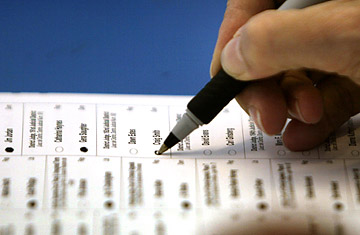
A ballot is marked in Dallas, Texas, November 7, 2006.
The big states have decided to flex their muscles when it comes to the 2008 Presidential primary schedule. California has announced a Tuesday Feb. 5 date. New York and nearly a score other states have indicated they'd like to hold their primaries on that day too. Florida is considering upping the ante and going even earlier — but both the G.O.P. and Democratic Party are looking askance at that proposal for fear of aggrieving the traditional early decision states Iowa (which holds its caucus on Jan. 14) and New Hampshire (Jan. 22). And then there is Texas. At the moment, three similar bipartisam bills in the state legislature aim to move the Texas primary from March to February. But some Texans arent too sure it is wise to rush in with the crowd.
"It's an extremely bad idea," says longtime political analyst and former Texas G.O.P. official Royal Masset. With the Iowa caucuses and the New Hampshire primary still viewed as key launching pads, Masset explains, the loading up of the early February calendar can only mean that huge pieces of real estate and population like California will get lots of campaign ads and literature but will see little of the candidates themselves. "Those states will see many political commercials and receive enough direct mail to deforest a small state," Masset wrote in a recent commentary. "But they won't be talking to candidates, which means candidates won't be talking to them."
Indeed, if the big primaries now fall so close to the end-of-the-year holidays, many Americans may be too busy with other things (or recovering from them) and not ready to focus on the Presidential race, says University of Texas political science professor Bruce Buchanan. Voters are likely to be hearing Rudy Giuliani's jingles along with "Rudolph the Red-Nosed Reindeer" and find their mailboxes stuffed with Christmas cards from Hillary (and Bill). Buchanan is concerned that the early primaries will energize "the fringes of the two parties," leading to more polarization in the political scene. It also denies voters a chance to fully explore the credentials and record of candidates, perhaps an advantage in Texas to candidates like Giuliani whose past stances might not be in tune with some primary voters.
Given the crowded field, Texas Republicans would be better served by keeping their powder dry until March or later, Masset says. For the last 30 years, Republicans have followed a somewhat orderly succession process in picking their nominee, but this year's race is wide open. The last time there was an open race, Texas played a significant role that paid off later for the state's conservatives. In 1976, after a string of losses by challenger Ronald Reagan to President Gerald Ford, Texas gave Reagan a big win, making the race very close and setting up Reagan for his eventual nomination in 1980. Buchanan also thinks a later primary could help candidates like Democratic New Mexico Governor Bill Richardson who have "great resumes, but a low profile." An early Texas primary would likely benefit the deep-pocketed, organized front-runners, Buchanan says. What's more, with early voting — popular in Texas where 34% of the general election ballots were cast early in 2004 — ballots would be cast at local grocery stores and community centers on Jan. 19, three days ahead of the New Hampshire primary, giving non-front-runners even less time to make an impression. Divining whether Texas wins influence with a move is "speculative and interesting, but it could go either way," Buchanan says.
Democratic lawmakers in Texas argue that the change would boost the influence of Hispanic voters on the nomination process. Their Republican counterparts tout the change as a way for Texans to get more bang for the considerable bucks they pour into Presidential politics. But in the end, if state legislators in both parties decide to make the change, it may have little to do with national politics. "It's an incumbent protection act," says Harvey Kronberg, editor of The Quorum Report, a nonpartisan Austin-based political newsletter. "An early February primary means that challengers will have to file in early December and try to get voters' attention during the Christmas holiday. For all practical purposes, challengers will have three weeks to unseat incumbents instead of the eight weeks under law." It should be against the law for politicians to give themselves Christmas gifts.
